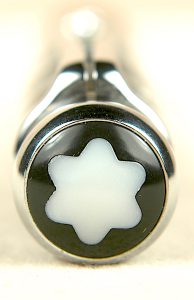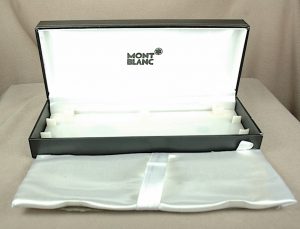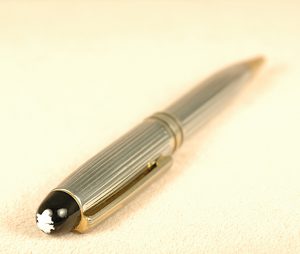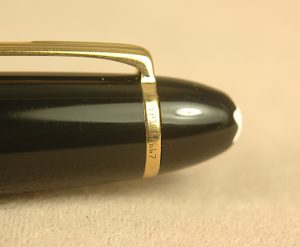We recently received two more great examples of fake Montblanc pens from a collector to share with you. As you might recall, we wrote a much more extensive piece about identifying fake Montblancs in a piece we called: Don’t Be Fooled by Fake Mont Blanc Pens.
This time we are just going to showcase the features of these two specific fraudulent pens.

A close inspection of this pen reveals that it is a reproduction of the rubberized Montblanc Starwalker fineliner pen.
Up first is meant to be a rubberized Montblanc Starwalker fineliner. At a glance, it looks like it could be the real thing. BUT! A closer inspection proves it isn’t. The first thing you can notice in real life, and not online, is that the rubber material is very sticky as it decomposes. We haven’t experienced that in the originals, but this is common in cheaper rubbers and plastics. Those cheap, 1990s Sensa office pens with the huge “ergonomical” rubber grips decomposed to a sticky mess all the time, just like this pen.
The biggest visual error you can spot is that the tail is black and not platinum or rhodium plated like the original.
We can’t get a good enough photo of it, but the floating star inside the clear cap topper is scratched.
Plus, there is no “Pix” written under the pocket clip. While that pocket clip does have a serial number, it is a two-part number with a gap between numbers, which Montblanc doesn’t do. Lastly, the pocket clip has a more obvious weld to the cap.

Pictured is a fake Montblanc Hommage à Nicolaus Copernicus ballpoint pen. Yet, to hold in real life, will easily prove it is not the real thing.
The other pen on today’s showcase is meant to be a copy of the Patron of the Arts Montblanc Hommage à Nicolaus Copernicus. At a glance to the untrained eye, it passes. It has what looks like the anthracite-colored lacquer on the ribbed body with potentially sterling silver rings. There’s what appears to be a diamond in the clip.
Yet, the real pens had a yellow diamond or green-yellow jewel, depending on which edition you had.
Again, in real life, this pen is extremely light weight. Sometimes experience helps, and, having held real samples of the Copernicus, this feels 2 or 3 times lighter.
Another big give away is that there are no markings on this pen. No serial number, “Pix” under the clip,” no limited edition number and no “Germany.”

It is difficult to see in the photo, but you can see the edges where the white part was glued into the black part of the logo. On Montblanc’s high-end pens, there are no seams that are detectable, and we think the original pen had a mother-of-pearl star instead of a white plastic star.
One sneaky thing the pen forgers got right is that it uses real Montblanc ballpoint refills.
The last big thing they got wrong is the company brand logo of the 6-point star or snow cap representing the mountain. This one is a soft plastic that looks odd in real life, and you can see the edges of the hole they glued it into on the tail. True Copernicus pens have a seamless logo that is lacquered over to look like one piece regardless as to whether it really is.
Last but not least is the box. We received two pens in one box that is made to look like a true Montblanc box. The differences are pretty obvious. Most simple MB boxes similar to this have a leather or faux-leather outer casing in black. This is a black paper case. On the inside the company name is poorly silk screened on with some black ink bleeding into other parts of the name/logo. Annnd, the pad that holds the pen is a cheap cardboard with a paper tray beneath it. The black leather Mont Blanc cases have a padded beige or tan cloth lining, which you aren’t intended to get underneath. Papers for the legit pens are stored between leather box and the outer cardboard box. Please see the picture of the fake below.
As always, we hope this helps you spot fake Montblanc pens in your quest for inky glory as a writer or collector.


 Shopping Cart
Shopping Cart









